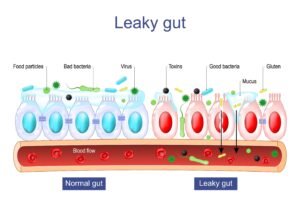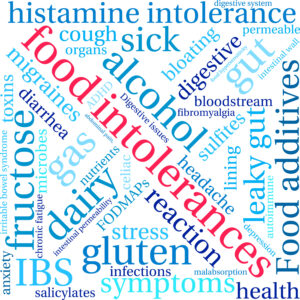
03 Apr The Gut-Immune Connection: How Leaky Gut Drives Autoimmunity
Our gastrointestinal tract serves a far more profound purpose than simply digesting food. The gut constitutes over 70% of our immune system, harbors trillions of bacteria that regulate everything from metabolism to emotions, and even produces a myriad of hormones and neurotransmitters. In other words, gut health forms the very foundation of our overall health.
When gut health goes awry, the consequences can be far-reaching. Research now demonstrates that intestinal permeability, more commonly termed **leaky gut syndrome**, plays a pivotal role in the development of autoimmunity. But before diving into the mechanisms linking your gut to immune-mediated conditions, let’s cover some basics.

What Is Leaky Gut Syndrome?
The gut lining provides a critical barrier between your internal and external environments. The innermost layer of intestinal cells is bound together by tight junction proteins, limiting what can traverse the spaces between cells. Consider it the bouncers of your gut, strictly controlling what gets in and what stays out.
In an unhealthy gut, the integrity of the intestinal lining becomes compromised, allowing unwanted substances to “leak” across the barrier. It’s like a nightclub with lackadaisical bouncers – anyone and anything can enter. Leaky gut syndrome, therefore encompasses this state of intestinal hyperpermeability.
Substances that can leak through the porous gut lining include:
-
-
-
- Bacterial toxins
- Incompletely digested food particles
- Metabolic waste products
- Enzymes
- Bile acids
- Yeast
- Airborne pollutants or chemicals
-
-
Once these inflammatory compounds enter your body, and into the bloodstream, they wreak havoc on health, triggering widespread inflammation, overactivating the immune system, and disrupting organ systems distant from the gut.
Leaky Gut As The Gateway to Autoimmunity
The immune activity in your intestines offers a fascinating glimpse into the connection between leaky gut syndrome and autoimmunity.
Intestinal immune cells function much like border patrol agents. They regularly encounter foreign substances, such as food proteins and gut microbes, deciding what to attack and what to permit into circulation. This constant immune activity in the gut is appropriately termed the “peacekeeper of the immune system.”
In a healthy gut, the intestinal immune system masterfully learns to tolerate harmless compounds like food particles and commensal bacteria. But when intestinal hyperpermeability allows excessive amounts of undigested proteins, pathogens, and toxins into the bloodstream, it overwhelms the regulatory capacity of gut immune cells.
The ensuing immune response triggers aggressive inflammation and loses routine checks and balances. Immune cells begin overreacting to benign substances that usually wouldn’t cause issues. Over time, this can prompt the body to attack its own tissues, forming the basis of autoimmunity.
The Autoimmune-Leaky Gut Cycle
The relationship between leaky gut and autoimmunity becomes self-perpetuating in a vicious cycle:
**1. Leaky gut → immune activation → inflammation → tissue damage**
Various triggers like chronic stress, infections, NSAIDs, high sugar diets, antibiotics, and aging compromise the integrity of the intestinal barrier. As larger inflammatory molecules leak into circulation, gut-associated immune cells spur widespread inflammation that can damage distant tissues.
**2. Tissue damage → autoantibody formation → autoimmunity**
When immune cells attack body tissues, proteins, and DNA spilled from dying cells enter circulation. If intestinal hyperpermeability persists, these damaged tissue components leak across the gut barrier, where immune cells generate autoantibodies against them.
**3. Autoimmunity → gut inflammation → worsened leaky gut**
Circulating autoantibodies and inflammatory immune cells infiltrate tissues, provoking further damage. Autoimmune conditions like lupus, Hashimoto’s thyroiditis, type 1 diabetes, or rheumatoid arthritis translocate immune cells into the gut lining, worsening intestinal barrier integrity.
In essence, autoimmunity generates inflammation that disrupts the gut lining, allowing more autoimmune fuel into circulation that further drives disease progression. Resolving this vicious cycle requires healing the gut.

The Gut-AutoImmune Connection
Diet, Stress, Infections – What Disrupts The Gut Barrier?
What instigates the cascade leading to autoimmunity? Several key factors compromise the intestinal barrier:
**Poor diet composition**: Diets high in refined sugars, unhealthy fats, and processed foods can negatively alter gut microbiota and weaken the intestinal barrier.
**Gluten and other food sensitivities**: Incompletely digested gluten peptides and other food sensitivities can trigger inflammation and increase intestinal permeability.
**Medications that damage the gut lining**: Regular use of NSAIDs and PPIs can increase intestinal permeability and alter the gut microbiome.
**Chronic stress and elevated cortisol**: Stress hormones like cortisol can disrupt the intestinal barrier and shift the gut microbiome towards a more inflammatory profile.
**Circadian rhythm disruption**: Misalignment of the circadian rhythm can impair the intestinal barrier through various mechanisms.
**Gastrointestinal infections**: Bacterial, viral, and parasitic infections can damage the gut lining and increase permeability.
**Small intestinal bacterial overgrowth (SIBO)**: SIBO can degrade the mucus layer, inflame the epithelial lining, and increase intestinal permeability.
**Environmental toxicants and pollutants**: Exposure to pesticides, heavy metals, and other toxins can disrupt tight junctions and trigger inflammation in the gut lining.
**Nutrient deficiencies**: Deficiencies in vitamins, minerals, and amino acids can impair the integrity of the intestinal barrier.
**Aging and senescence of gut barrier cells**: With age, intestinal cells become more susceptible to oxidative stress and cellular senescence, making the gut barrier more vulnerable.
**Food Sensitivities and Intolerances**: Undigested food particles can initiate an inflammatory cascade when they traverse the intestinal lining, perpetuating damage.
**Antibiotic Exposure**: Antibiotics can decimate beneficial gut flora, enabling pathogenic overgrowth and reducing production of short-chain fatty acids that nourish the gut lining.
The complex interplay between these factors can erode multiple elements of the intestinal barrier, setting the stage for the development of autoimmunity in genetically predisposed individuals.
Healing Leaky Gut – An Essential Step for Autoimmunity
Here are 16 key strategies to restore gut barrier integrity:
**Adopt an anti-inflammatory diet**: Focus on nutrient-dense whole foods and eliminate common trigger foods.
**Increase soluble fiber intake**: This nourishes beneficial gut bacteria and strengthens tight junctions.
**Restore beneficial gut bacteria**: Use fermented foods and probiotic supplements to rebalance your microbiome.
**Supplement with L-glutamine**: Essential for regenerating and repairing the gut lining.
**Manage stress**: Implement mind-body practices like meditation, yoga, and deep breathing.
**Optimize sleep and circadian rhythms**: Crucial for maintaining gut barrier function.
**Incorporate anti-inflammatory herbs and spices**: Such as turmeric, ginger, and green tea.
**Heal the gut lining with targeted nutrients**: Including zinc, vitamin A, vitamin D, and omega-3s.
**Minimize exposure to environmental toxins**: Choose organic food and non-toxic products.
**Address underlying infections or dysbiosis**: Seek help from a healthcare provider.
**Support liver function**: Through a nutrient-dense diet and liver-supportive herbs.
**Engage in regular moderate physical activity**: To improve gut barrier function and reduce inflammation.
**Consider intermittent fasting**: To promote gut health, with guidance from a healthcare provider.
**Optimize digestive function**: Ensure thorough chewing and consider digestive aids if necessary.
**Identify and remove food sensitivities**: Through elimination diets or testing.
**Work with a functional health practitioner**: For personalized guidance and support.
By implementing these strategies, individuals can take proactive steps towards reversing intestinal hyperpermeability and mitigating inflammatory and autoimmune conditions rooted in leaky gut.
The Takeaway
Leaky gut syndrome is a pivotal factor in the development and progression of numerous chronic inflammatory and autoimmune conditions. It triggers a cascade of immune dysregulation, leading to systemic inflammation and tissue damage that can manifest as diverse symptoms, from joint pain and fatigue to more severe autoimmune diseases.
Addressing leaky gut is a crucial first step in managing and overcoming these health challenges. By adopting an anti-inflammatory diet, managing stress, supporting a healthy gut microbiome, and minimizing exposure to environmental toxins and other inflammatory triggers, individuals can begin to restore the integrity of their intestinal lining.
This process of healing the gut barrier can help to regulate the immune system, reduce inflammation, and alleviate the symptoms associated with chronic conditions. It is a foundational approach that can be complemented by targeted nutritional support, lifestyle modifications, and personalized interventions guided by a functional health practitioner.
**While the journey to optimal gut health may require dedication and persistence, the rewards are significant. By extinguishing the fire of autoimmunity at its source, individuals can reclaim their vitality, reduce their reliance on symptom management, and pave the way for long-term wellness.**
***Call To Action***
Ready to transform your health and embrace a future free from the constraints of autoimmunity? The journey to wellness begins with a single step, and I am here to guide you through it. Sign up for a Health Breakthrough Session. Together, we will explore the possibilities of a life balanced in harmony with your body’s needs, unlocking the door to vitality and well-being. Read more about my Approach HERE
Don’t wait for change—create it. Your path to a vibrant, healthier you is just a conversation away. Take that step now!






Sorry, the comment form is closed at this time.